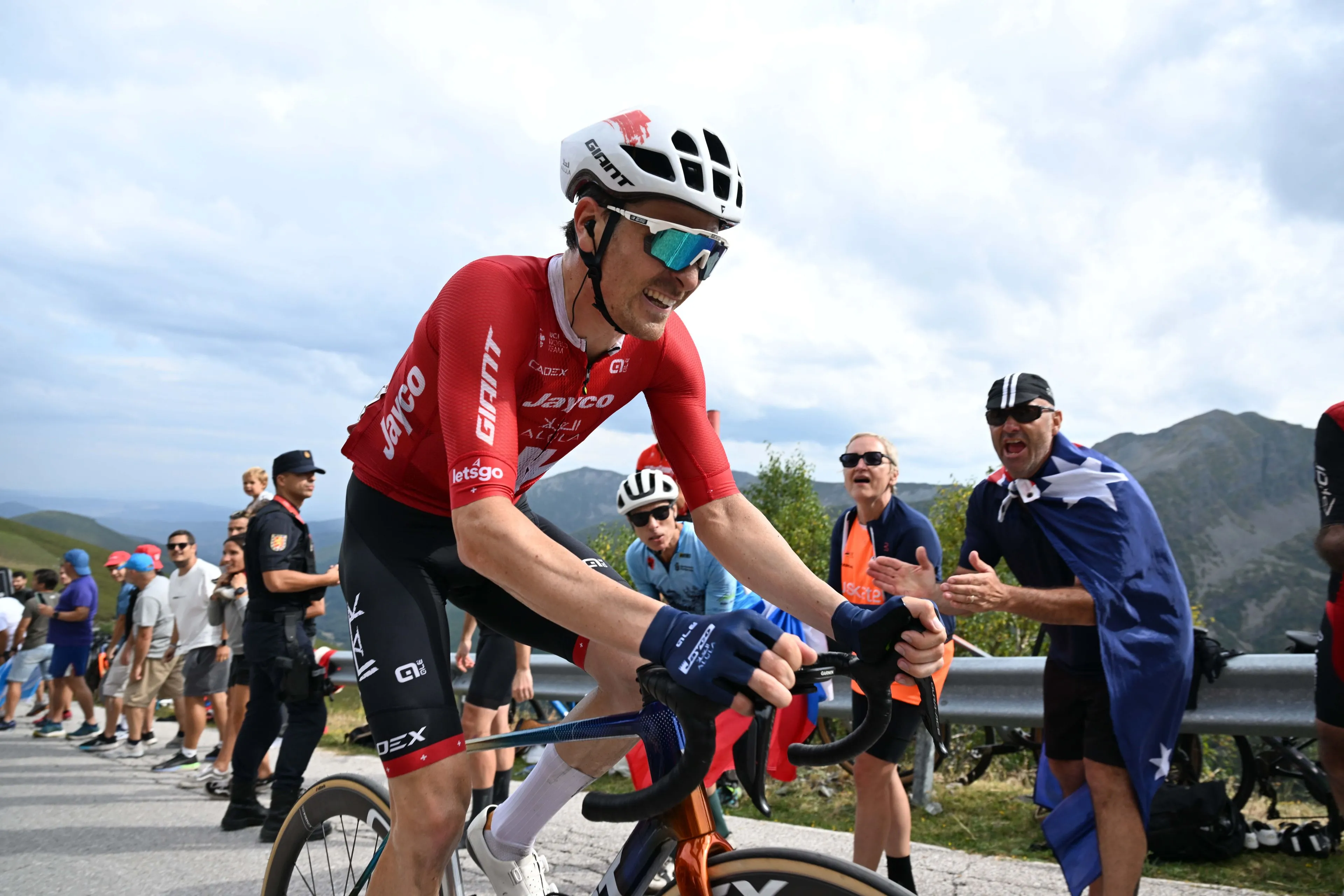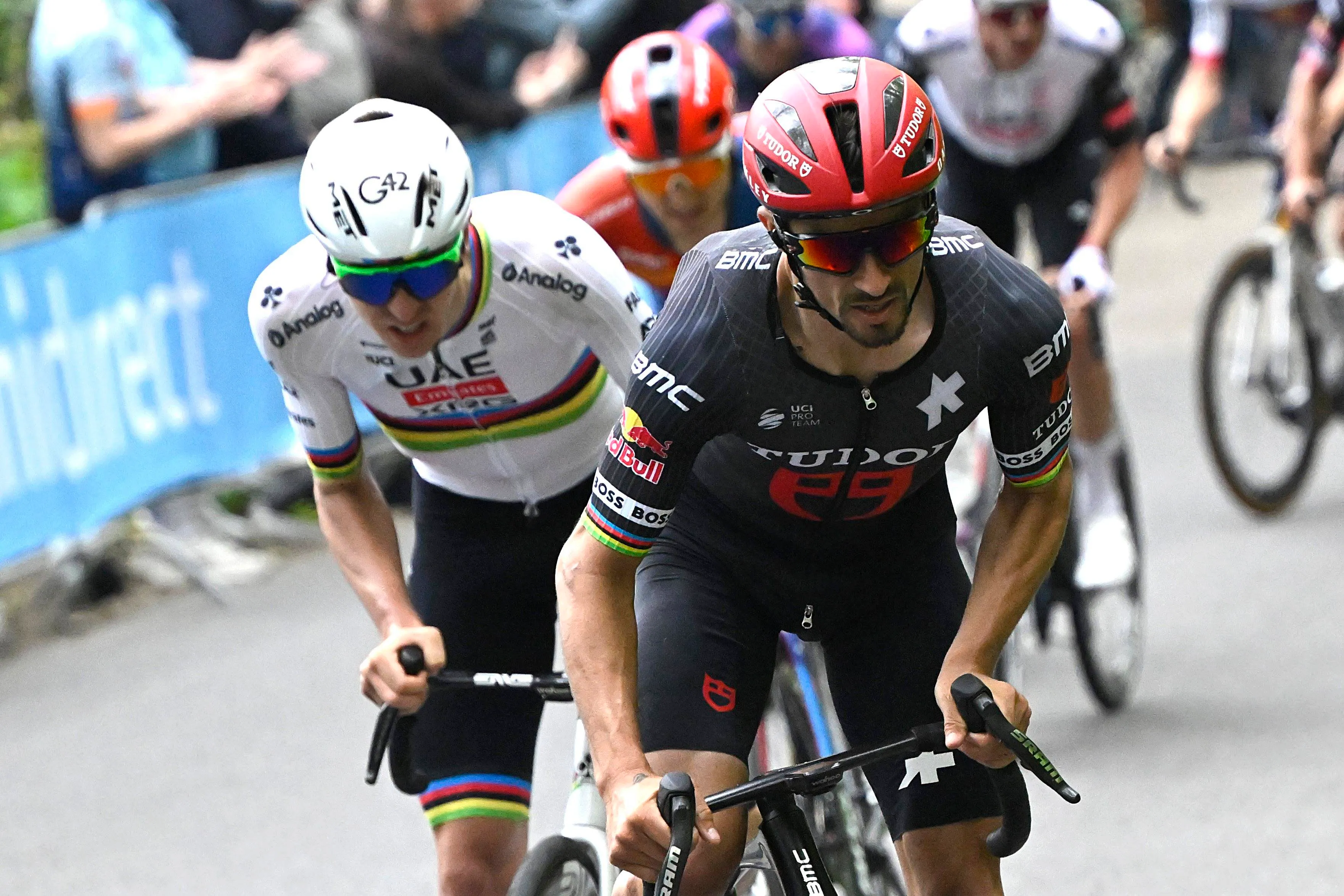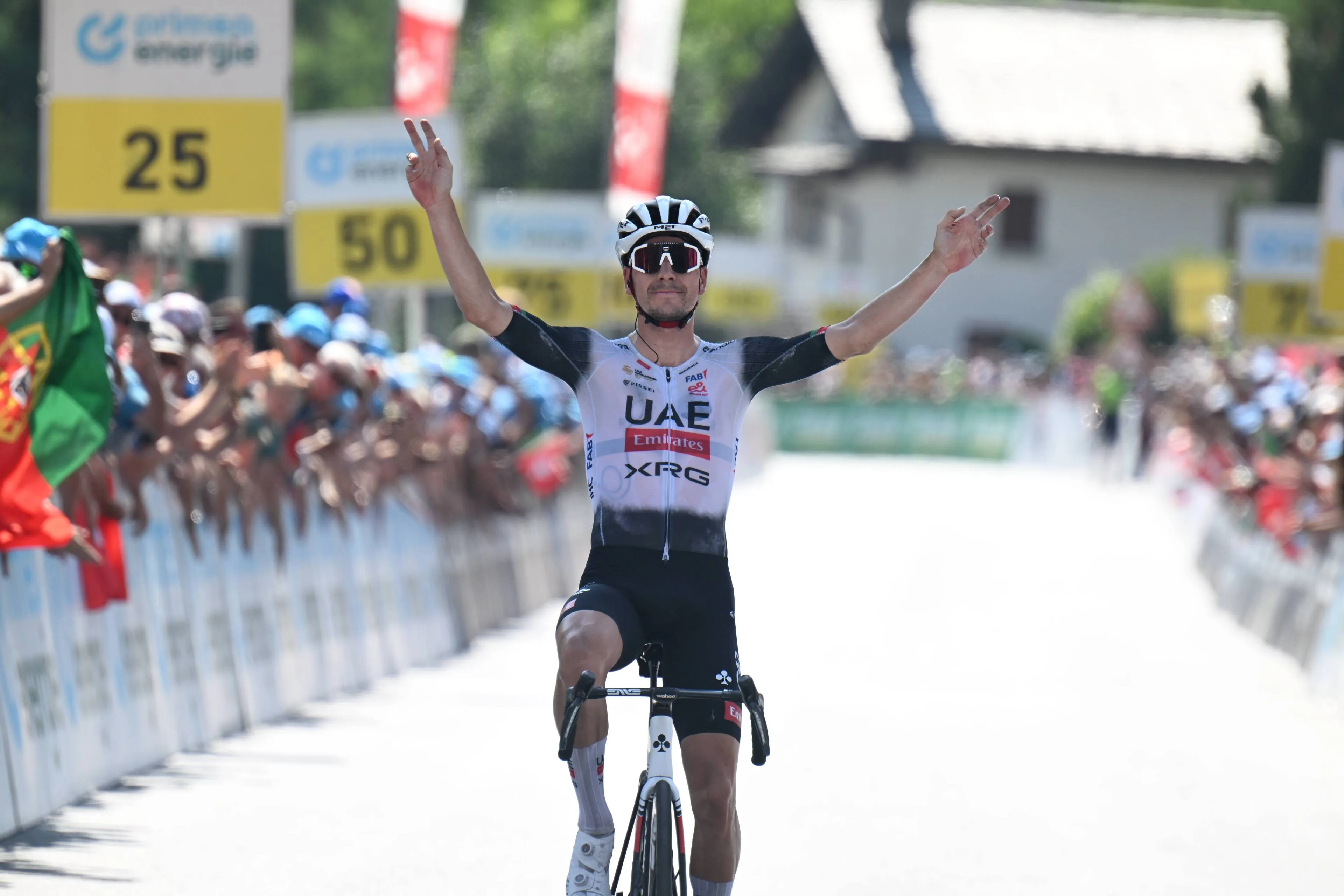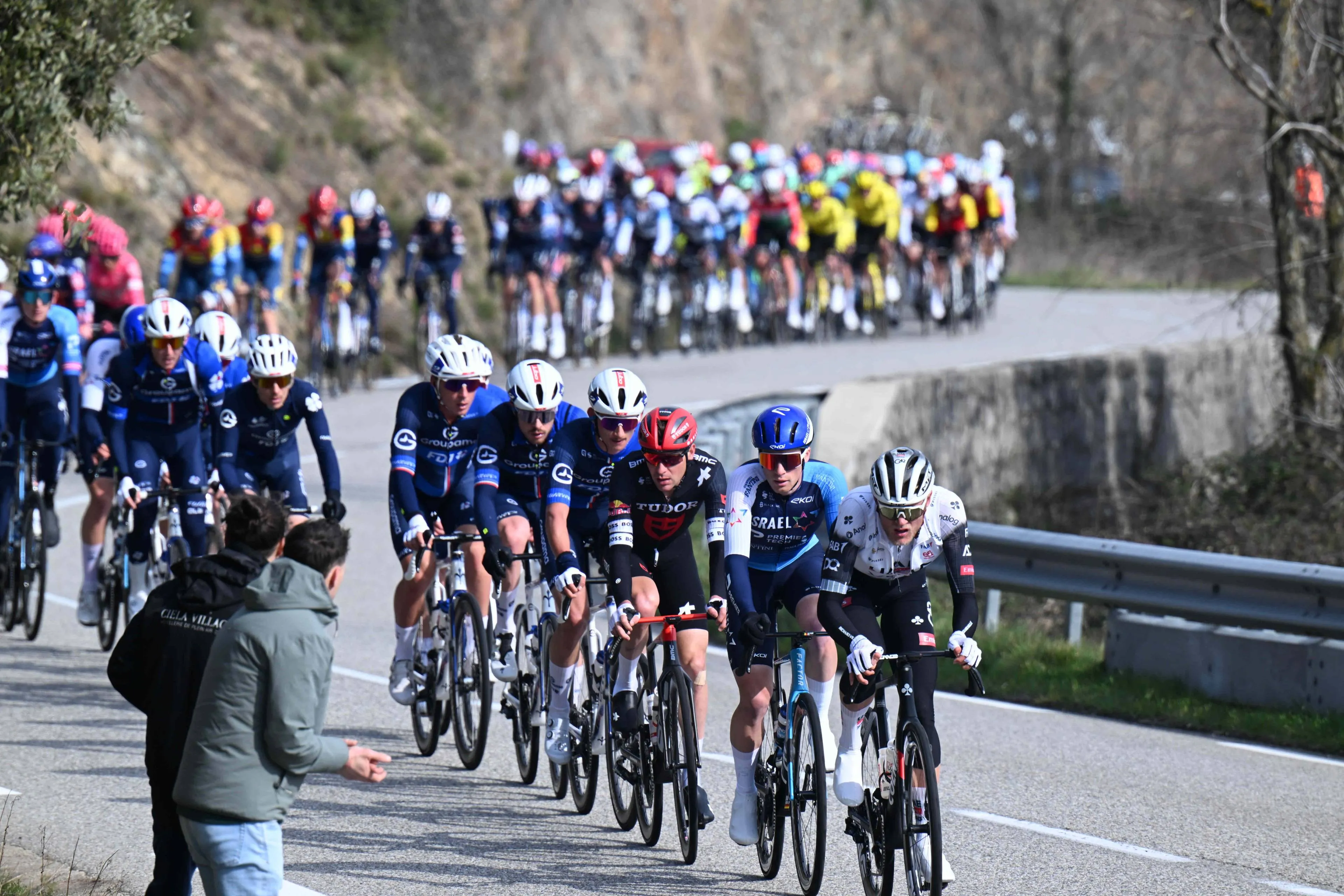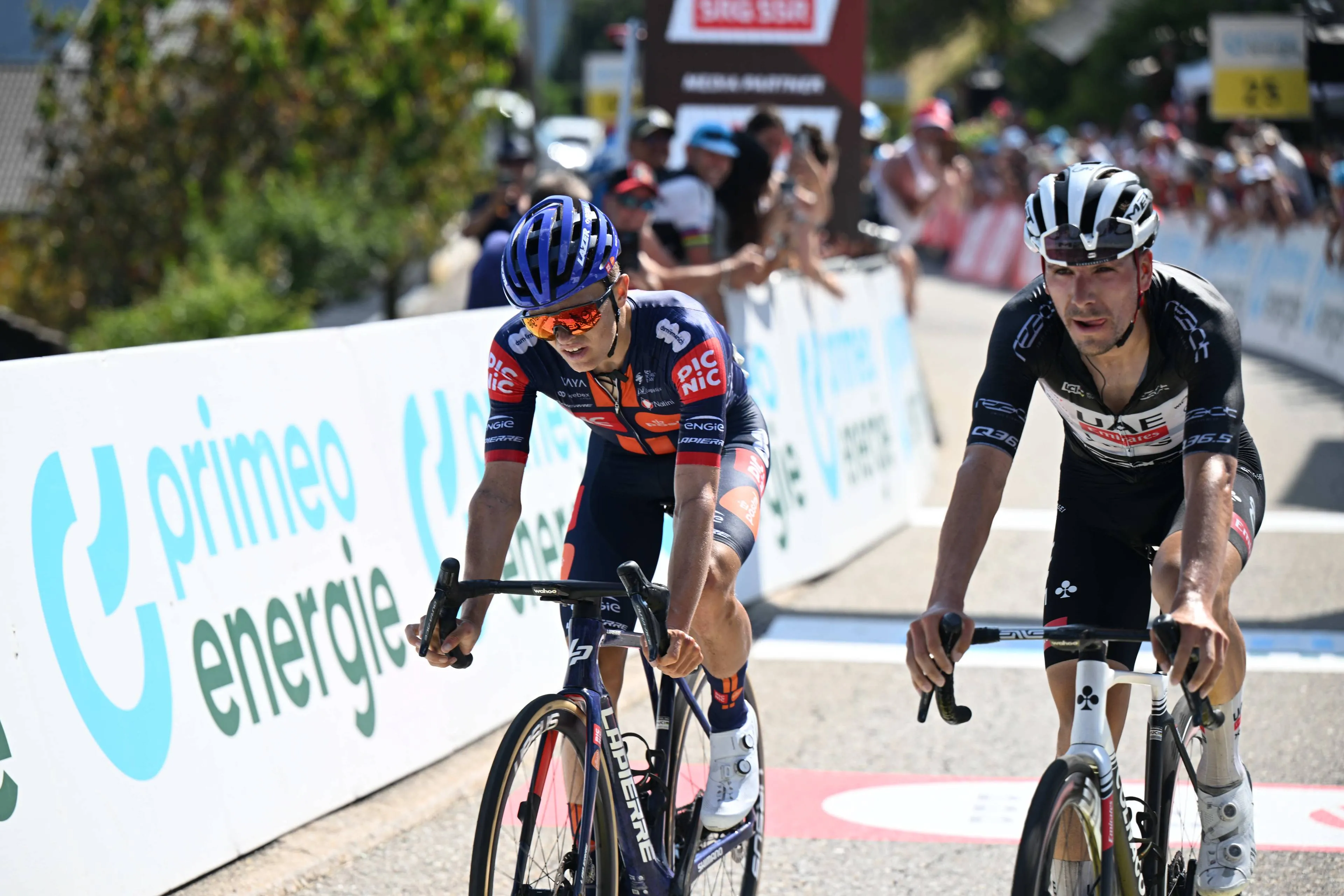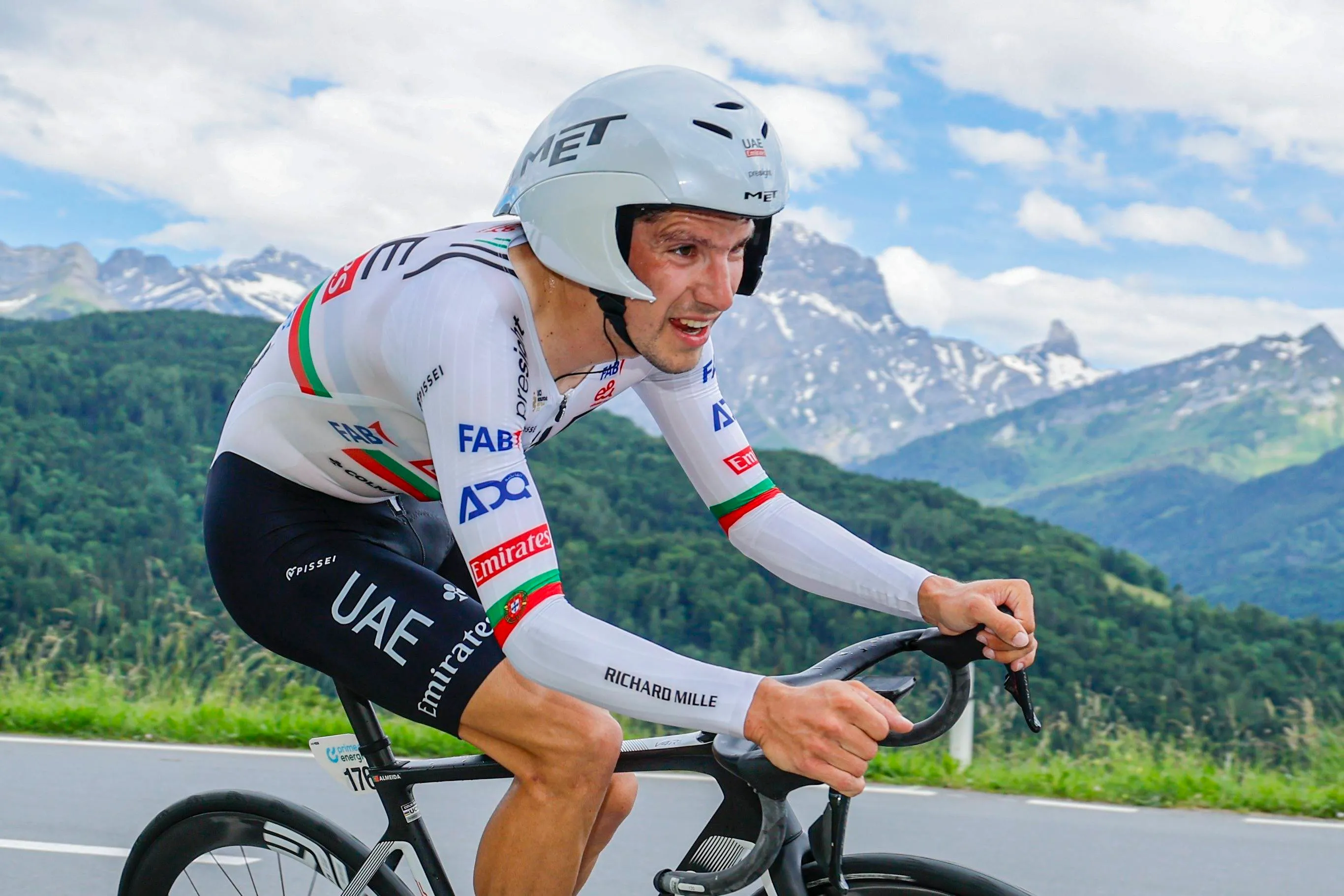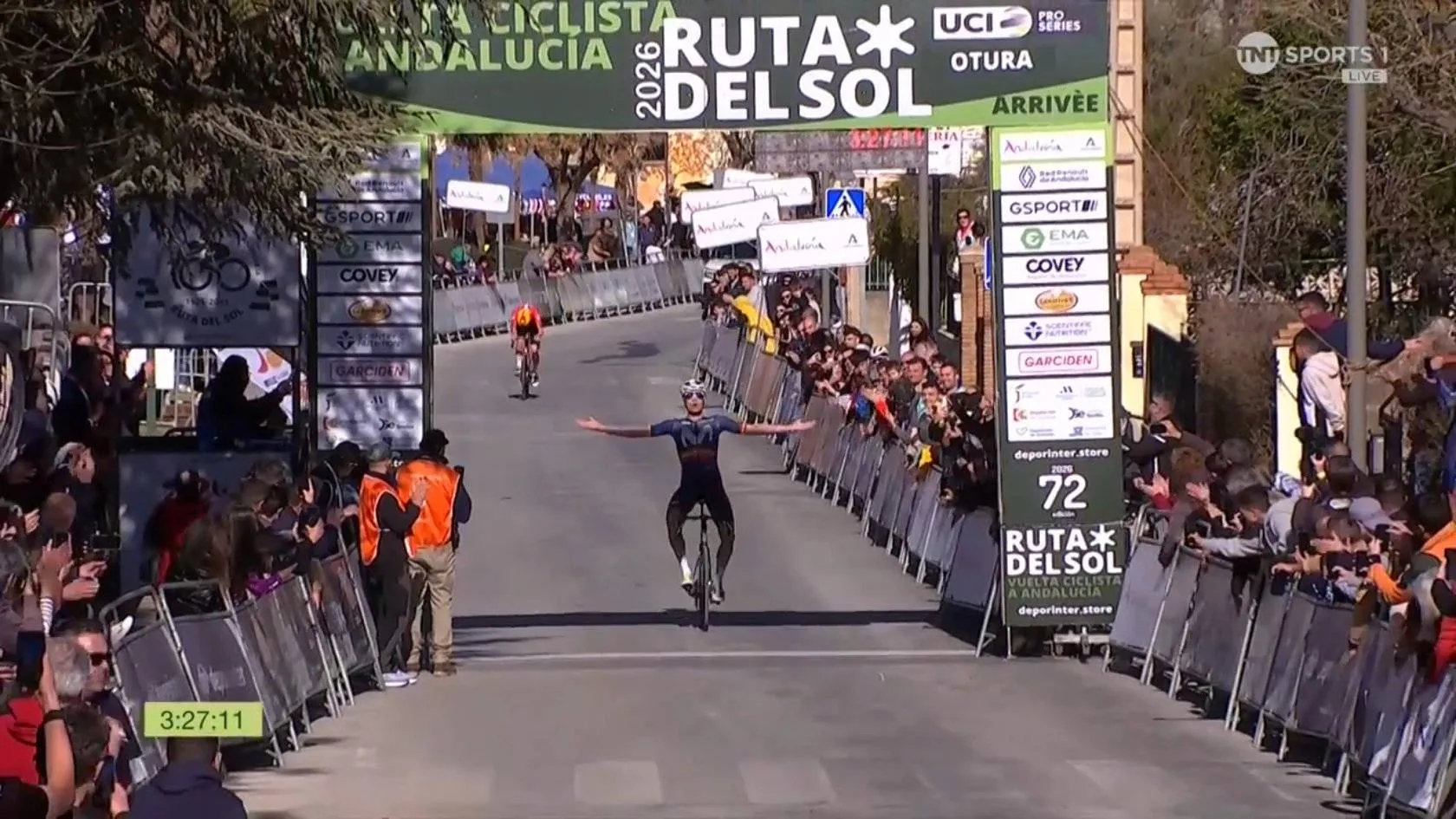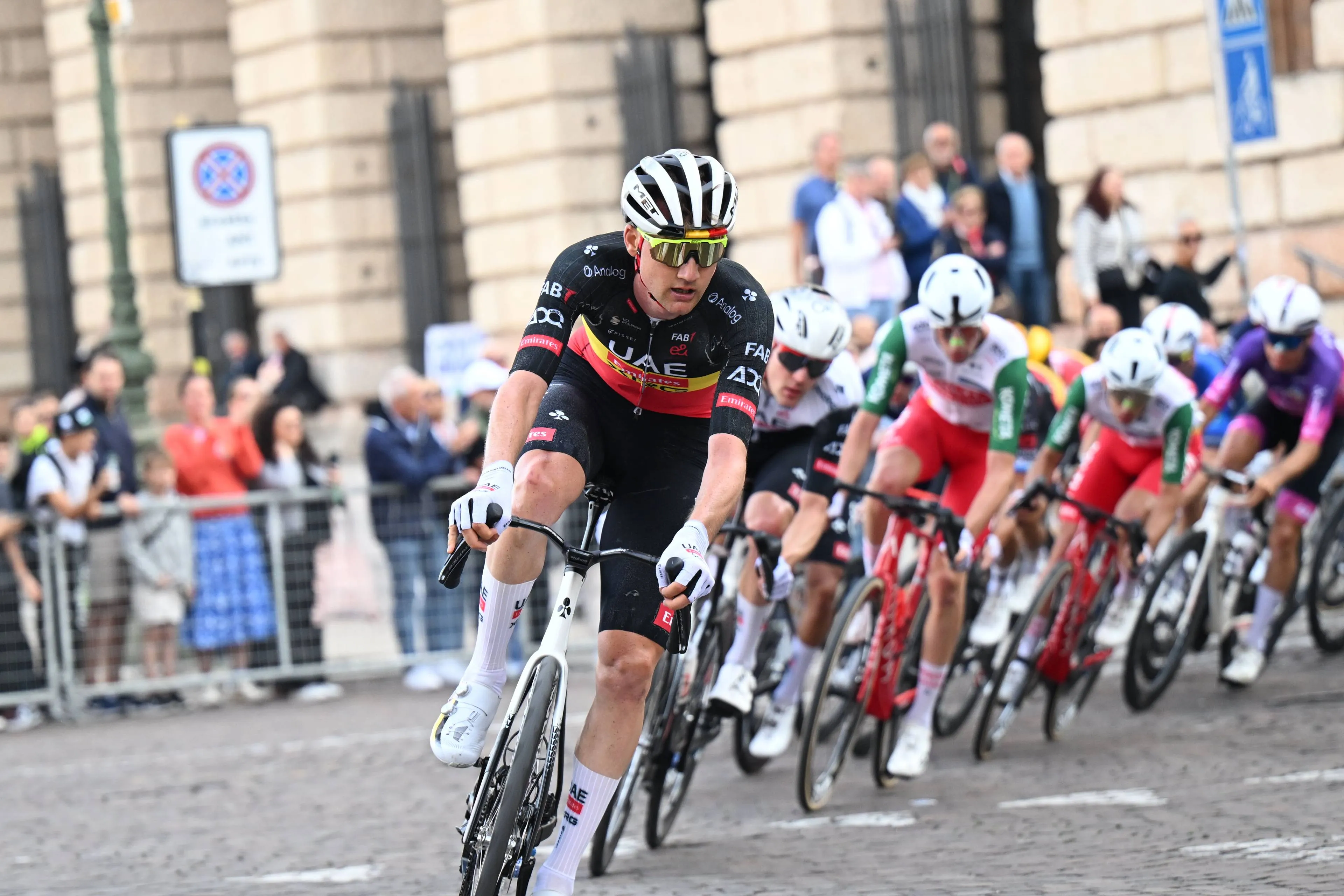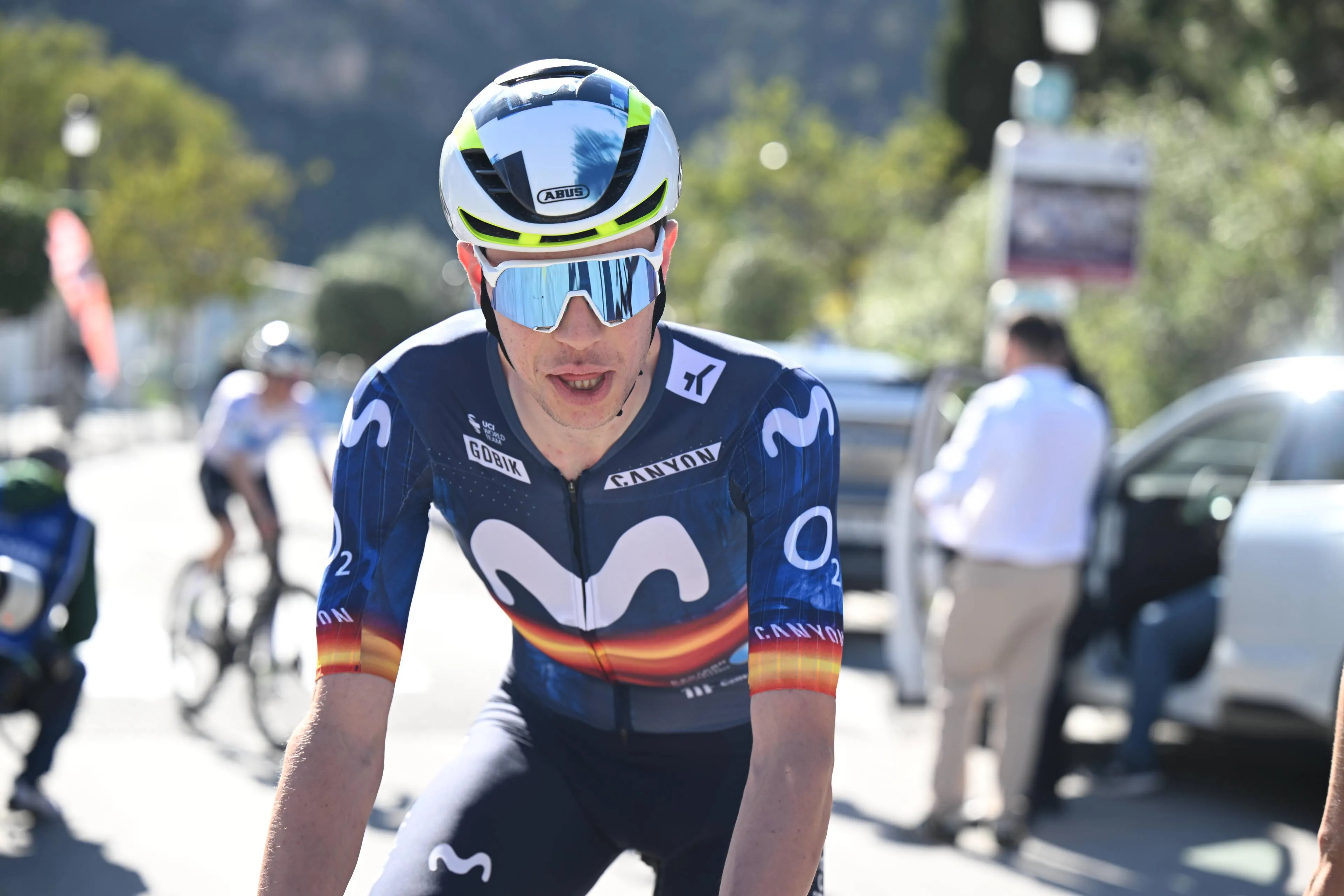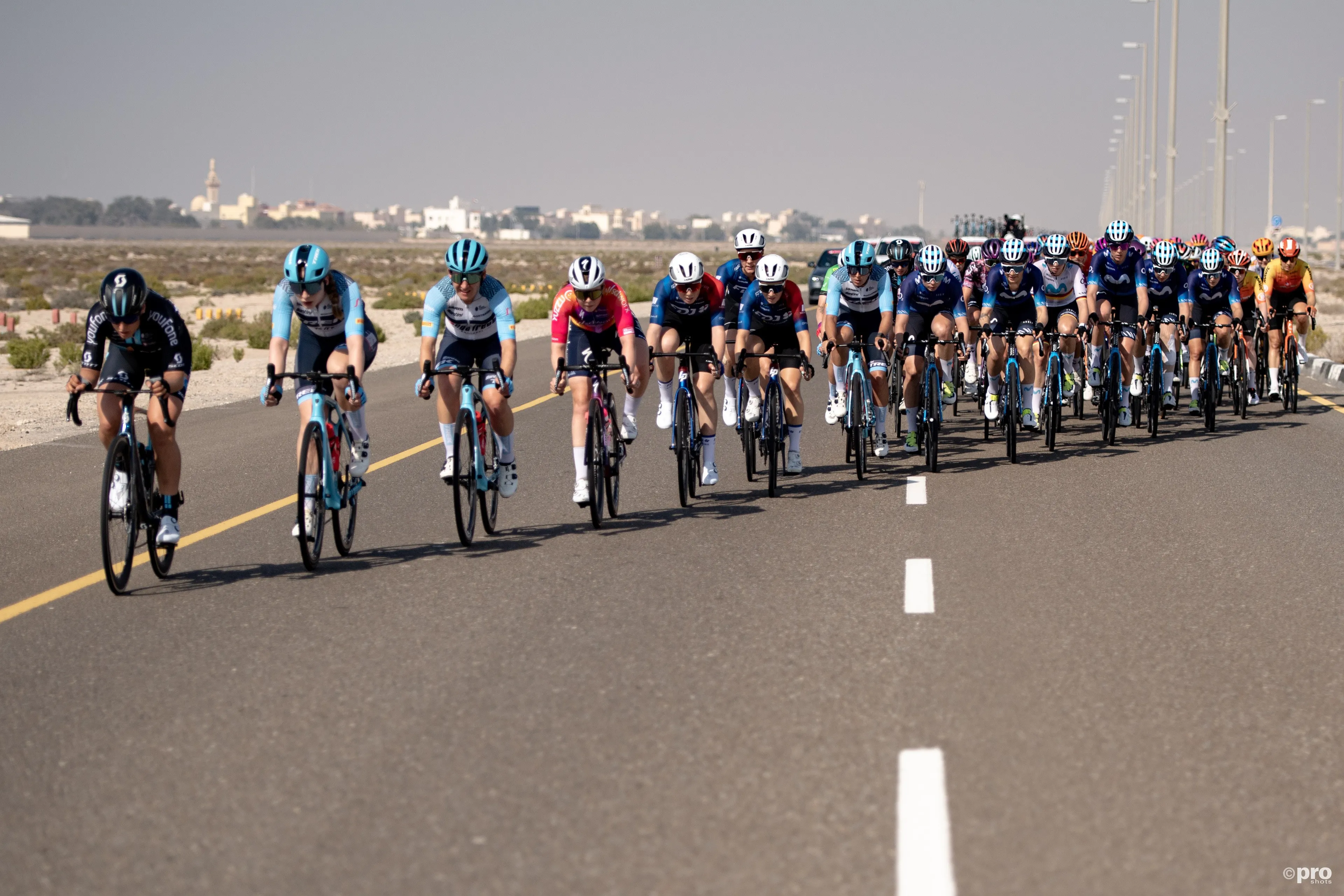
From the 15th to 22nd of June the World Tour peloton will tackle the Tour de Suisse, one of the hardest races in the calendar and the last of the 'big 7' one-week stage-races in the calendar. We take a look at it's profiles.
The eight-day race consists of one (hilly) sprint stage, four days that should be for a mix of puncheurs and climbers, two where only the climbers should thrive and lastly a mountain time-trial to conclude the race and the battle for the overall classification.
Read also
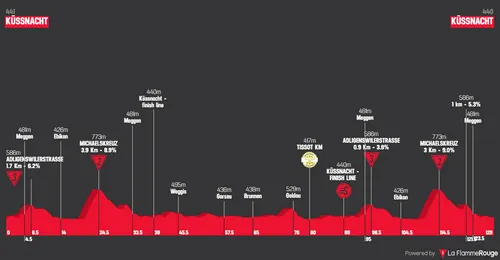
Stage 1: Küssnacht - Küssnacht, 179.4 kilometers
The first stage of the race will be a very short one, rather quick, but with quite some difficulties added into the mix. In classic Swiss fashion, it's a day that is well suited to those sprinters who can climb, but equally these are the days that favour attackers.
There is not a huge amount of climbing and most of the day is indeed flat however there will be action in the ascent to Michaelskreuz. The ascent is 3 kilometers long at 9%, enough for differences even amongst the strongest climbers in the race.
This ill be tackled on two occasions, the first of which early in the day, and the last with only a mere 14.5 kilometers to go. Taking into consideration that most of the finale is downhill - or similar - then it will be very hard to close differences created previously.
Read also

Stage 2: Aarau - Schawazsee, 177 kilometers
The second day of racing in Switzerland is one open to many riders in the finale. We should have a sprint in Schawazsee but this will be between the climbers and those who resist the small climbs throughout the 177 kilometers.
It's a day where a sprint looks rather inevitable, but only between who have the legs. There will be 2500 meters of climbing and most are in the final half. There is a combination of small climbs inside the final 55 kilometers that will make some impact in the peloton. The penultimate is 1.6 kilometers long at 6.7% and ends with just over 15 kilometers to go.
After a plateau section the riders face the final 5 kilometers which have an average gradient of just over 3% - providing the opportunity for a late attack to succeed. In the final 500 meters the road flattens out, but it should still be an interesting finale.
Read also
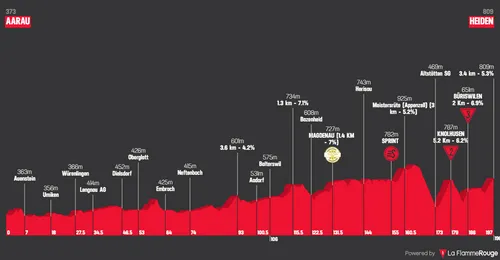
Stage 3: Aarau - Heiden, 195.6 kilometers
Another typical Swiss day, with the hilltop finish in Heiden providing opportunity for the puncheurs and climbers to fight for the win whilst the GC fight and bonifications will be in the mind of many during the day.
3000 meters of climbing in a day that from afar doesn't look that difficult. The first half is not indeed, but the rolling roads intensify quite a lot in the final half. And we'll have a combination of short efforts that will weight on the legs of many. But it's a more difficult finale than the previous.
There is a 5.2-kilometer long climb at 6.2% that ends with 17Km to go; immediately after a steep descent another 2 kilometers at 6.9% (they end with 10 kilometers to go... And all of this must be paced carefully as there is actually no descent afterwards, just a plateau section into the final ascent.
The climb into Heiden is not brutal, but hard enough for some action and potential gaps. It's 3.4 kilometers long at 5.3% which, with this difficult finale and likely a stage win/bonifications present at the line, will see an all-out effort from the GC favourites.
Read also
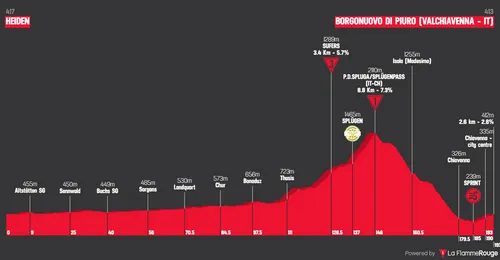
Stage 4: Heiden - Piruo, 193.2 kilometers
You could almost call it a transition day, as the opening kilometers of stage 4 are pan-flat and through the mountains heading down south. Nothing to note until the riders reach the one climb of the day, which is not easy by any means.
The climb to the 2110-meter high Splugenpass is very long, although it has flat sections inbetween. Officially, it is the final 8.8 kilometers that are usually taken as the climb itself, averaging over 7% - which in this altitude will definitely feel more difficult.
The climb finishes with 46 kilometers to go however, although most of them are downhill as the riders lose 1900 meters in altitude. The finale will be in Borgonuovo di Piuru across the border in Italy already; and it will be a slightly uphill finale for those who are still in contention for the stage win.
Read also
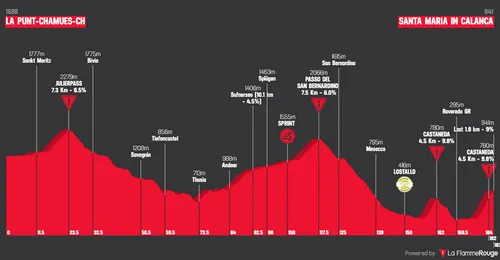
Stage 5: La Punt - Santa Maria in Calanca, 183.8 kilometers
Stage 5 will take place almost fully close to the border with Italy and finishing on the Italian-speaking area of the country. It's an unusual day of racing, starting at high altitude in La Punt instead of finishing there, and tackling early on the Julierpass which reaches almost 2300 meters of altitude.
The riders then slowly climb up to the Passo del San Bernardino, the final 7.5 kilometers of which average 6% and go above 2000 meters of altitude once again. This ascent ends with 65 kilometers to go, but it shouldn't have much influence on the day.
The final climb will, and it will be raced on two occasions, with 21 kilometers to go and the final time coinciding with the finish. The ascent to Castaneda is 4.5 kilometers long at almost 10% and packed with switchbacks from start to finish, it will be a thing of beauty. In the final time up the riders finish in the town above and the climb will average around the same gradients but for over 6 kilometers in length.
Read also
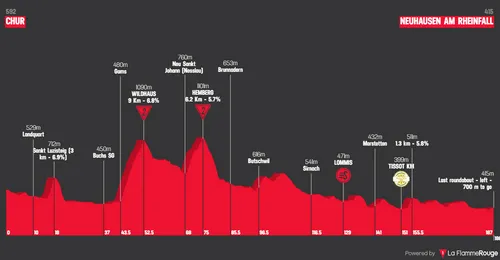
Stage 6: Chur - Neuhausen am Rheinfall, 186.7 kilometers
Perhaps the day best suited to the sprinters? By no means a flat stage or one that's easy for those who struggle with climbing, but most of it does come early in the day. By all means, at this point in the race and with such ascents early on, it could be one for the breakaway.
There are three big climbs, all within the first third of the day, that will be important. 3Km at 6.9%, 9Km at 6.8% and 6.2Km at 5.7%. If a strong group of climbers/puncheurs goes up the road on some like this it's impossible to control the peloton and keep a good amount of riders to control a breakaway throughout the rest of the day.
The peloton will have to do some difficult math on how to keep this one together, and it doesn't help that there are several small climbs throughout the course into Neuhausen am Rheinfall. However if they do bring it back together, the final kilometers are flat and nothing should come in the way of the sprinters.
Read also
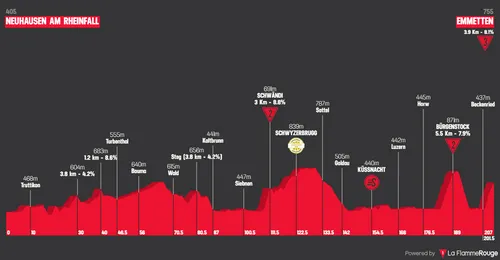
Stage 7: Neuhausen am Rheinfall - Emmetten, 207.3 kilometers
Another difficult day marked by the steep climbs and where most of the action should wait for the final kilometers. The summit finish in Emmetten will be very difficult and will set the stage for another GC battle.
The start to the day is hilly and explosive, and could see a very strong group go up the road. The day overall is not easy at all, and the fact that it packs 207 kilometers in distance will definitely be felt at the end of the day - on what is already the seventh day of racing.
However all the action should be saved for the final combination of climbs. The penultimate one to Bürgenstock is 5.5 kilometers long at 7.9% and ends with 18 kilometers to go. An incredibly fast descent will follow and in a flash the riders will be on the base of the final ascent.
Climbing to Emmetten, the riders will encounter 3.9 kilometers at 8.1%, a rather short effort but a steep one, in which further differences can be created.
Read also
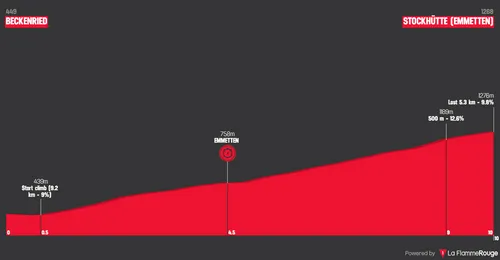
Stage 8 (ITT): Beckenried - Stockhütte, 10 kilometers
The final day of racing is a mountain time-trial which should also coincidentally be the queen stage. The ITT is 10 kilometers long, and 9 of them will average 9% uphill as the climb to Stockütte will be the most difficult of the race and will be setting big differences likely.
There isn't much to judge or gauge in this effort, the climb is rather constant and very steep all around. Because of it's difficulty, it's unlikely that riders will decide to take a time-trial bike or even extensions in the first flat kilometer, but instead focus fully on the ascent itself.
Read also
claps 0visitors 0
Just in
Popular news
Latest comments
- Minor flaws.... thats like suggesting Genghis Khan was a bit aggressive with other countriesslappers6619-02-2026
- Then you carry on if that's what makes you happyslappers6619-02-2026
- Fabio cannot catch a break.mij19-02-2026
- OK, today is the "air conditioner"... yesterday was a cramp... on saturday a bee will sting him in his tongue... his tongue will swell up and mustafa gets no oxygen. Because of his swollen tongue, Remco won't be able to give us a new excuse. Remco and the spanish rat Ayuso should be on the same team. They both have a ton of excuses and both of them are liars. Ad acta.Mou-Cro-HR19-02-2026
- Florian Lipowitz is secretly happy
 Rafionain-Glas19-02-2026
Rafionain-Glas19-02-2026 - The crucial thing to remember is that Remco was broken by the pace of Gall and Tiberi, not Del Toro's. Remco's excessive antics are because he doesn't want anyone to think that he's 'genuinely' struggling. You can always say 'he got cramps' because 'his preparation didn't go to plan', but the thing is that there is a limit to the number of excuses and exceptions that there can be. Eventually everyone just accepts that he's reached his ceiling on the climbs.
 Rafionain-Glas19-02-2026
Rafionain-Glas19-02-2026 - Bahraini suspicious..Santiago19-02-2026
- The problem is, a British 'boss' opening the gates, when the native workers not wanting them!
 leedorney19-02-2026
leedorney19-02-2026 - Who is overrating him on climbs? Everyone knows since ages it’s his weakness and needed years of work. Question us if he can do enough about it. For sure he won’t be able to improve his TT enough to compensate.Mistermaumau19-02-2026
- What do you call only seeing someone’s positives?Mistermaumau19-02-2026
Loading
Write a comment

